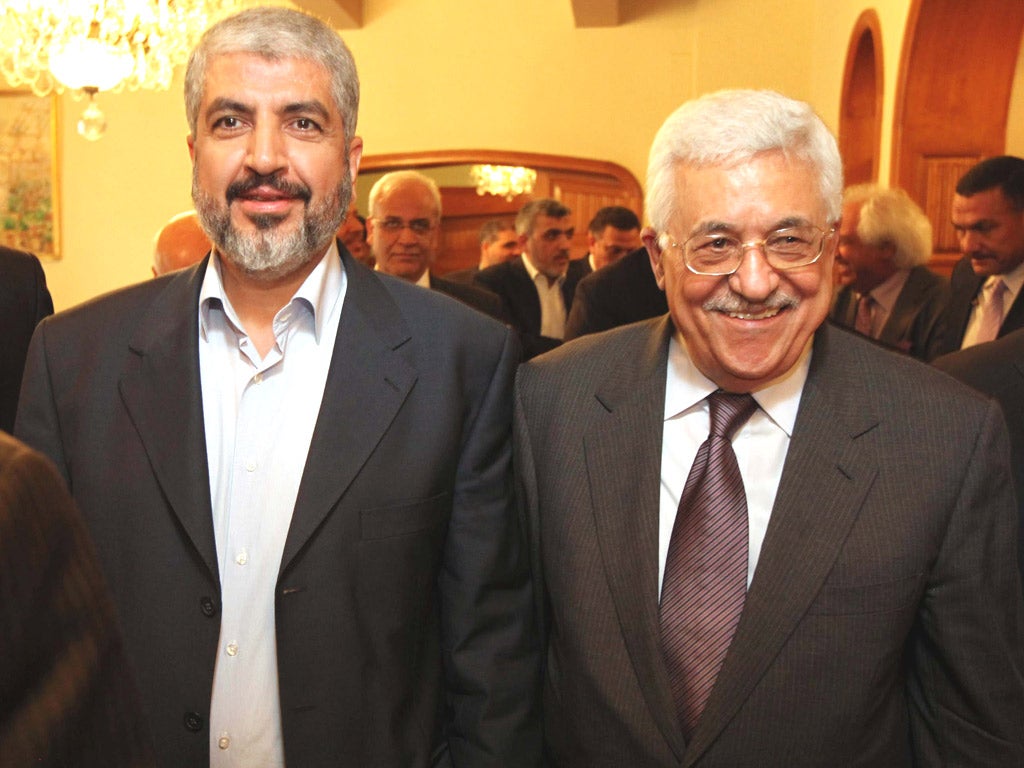Uncertainty in Hamas as leader decides to quit
Meshaal's departure may affect movement's shift to a more moderate stance towards Israel

Your support helps us to tell the story
From reproductive rights to climate change to Big Tech, The Independent is on the ground when the story is developing. Whether it's investigating the financials of Elon Musk's pro-Trump PAC or producing our latest documentary, 'The A Word', which shines a light on the American women fighting for reproductive rights, we know how important it is to parse out the facts from the messaging.
At such a critical moment in US history, we need reporters on the ground. Your donation allows us to keep sending journalists to speak to both sides of the story.
The Independent is trusted by Americans across the entire political spectrum. And unlike many other quality news outlets, we choose not to lock Americans out of our reporting and analysis with paywalls. We believe quality journalism should be available to everyone, paid for by those who can afford it.
Your support makes all the difference.The decision by Khaled Meshaal, the exiled political leader of Hamas, not to seek re-election when his term is up later this year has cast uncertainty on the movement's recent shift towards a more moderate approach in its struggle against Israel.
Hamas confirmed in a short statement at the weekend that Mr Meshaal, who has led the movement's political bureau since 1996, had requested to step down, but said that he may be asked to stay on. The move is the clearest indication yet that the exiled leadership in Damascus has ceded crucial ground in a deepening power struggle with Hamas' hardline leaders in Gaza, who have governed the Palestinian territory since ousting rival Fatah forces in 2007.
Once considered a radical, Mr Meshaal, who survived a botched assassination attempt by Israel nearly 15 years ago, has recently spearheaded a shift in the Islamist group's strategy that would move the group from armed resistance to Israel towards a popular non-violent resistance more in line with the Arab Spring movements that have toppled authoritarian rulers across the region in the past year.
Mr Meshaal, who has resided in Damascus under Syria's protection since 2001, has also been a driving force behind efforts to reconcile Hamas with Fatah, the mainstream party in the West Bank that is headed by Palestinian President Mahmoud Abbas. Ending the four-year rift between the two parties is regarded by Palestinians as critical to the reunification of the West Bank and Gaza.
His proposed departure would potentially throw both into disarray, given the fierce resistance he has faced from Hamas in Gaza, which has been unsupportive of reconciliation efforts, fearing that it could lose its power base, and which has opposed a strategic shift away from armed resistance against Israel.
Mr Meshaal's decision sets the stage for a critical leadership contest that could decide whether the movement adopts a more pragmatic approach under pressure from its ideological forebear, the Muslim Brotherhood in Egypt, or slides back towards radicalism.
It is expected that Mr Meshaal's deputy, Mousa Abu Marzouk, whose policies are broadly moderate, would succeed the outgoing leader. But he may face a political challenge from Ismail Haniyeh, the hardline de facto prime minister of Gaza, according to Palestinian media reports.
Mr Haniyeh's claim could benefit from recent reports that several Hamas officials have moved from the group's Damascus headquarters or are preparing to do so amid fears for their safety. Hamas has infuriated Iran, Syria's main sponsor, by refraining from publicly backing Syrian President Bashar al-Assad's regime, which has brutally suppressed a 10-month popular uprising.
Meanwhile, it remains unclear if Mr Meshaal will go. Hamas said that it had urged him to reconsider, and that the Shura Council, the movement's decision-making body, will have the final say on his political future. London-based Arabic newspaper al-Sharq al-Awsat quoted a Palestinian source as saying that the Hamas chief's request has been refused, suggesting that he could yet remain in power.
The date of Hamas' next elections is secret, but is expected to take place within the next six months.
Mossad agents disguised as Canadian tourists tried to kill Mr Meshaal in Amman in 1997 by injecting poison into his ear, leaving him in a coma. But the spies were caught, and a furious King Hussein of Jordan ordered Israel to release the antidote to the poison in exchange for its agents.
Join our commenting forum
Join thought-provoking conversations, follow other Independent readers and see their replies
Comments